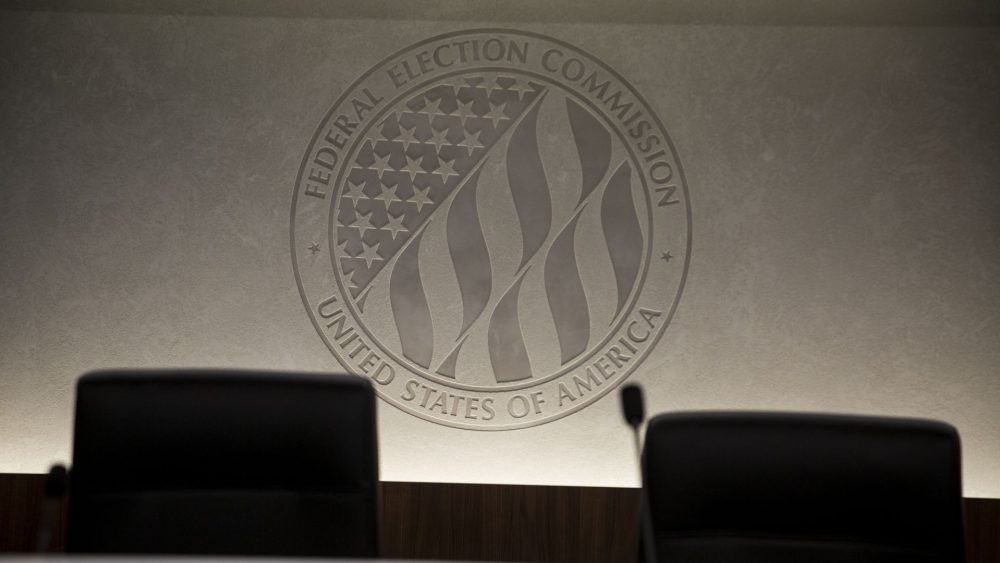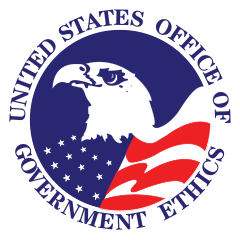January 19, 2021 •
FEC Advisory Opinion: U.S. Citizens Living Abroad May Purchase Political Advertising

FEC; Photo: Sarah Silbiger/CQ Roll Call
In one of its first decisions of 2021, the Federal Election Commission (FEC) released an Advisory Opinion agreed upon unanimously. Advisory Opinion 2020-02 does not break new ground, but affirms that citizens of the United States living abroad may purchase […]
In one of its first decisions of 2021, the Federal Election Commission (FEC) released an Advisory Opinion agreed upon unanimously. Advisory Opinion 2020-02 does not break new ground, but affirms that citizens of the United States living abroad may purchase online political advertisements in the U.S.
The FEC stated campaign finance regulations do not distinguish between citizens living in the U.S. and those residing abroad. They affirmed U.S. citizens living abroad may make expenditures, independent expenditures, and disbursements in connection with elections in the United States.
The opinion arises from a query of a U.S. citizen living in Canada wanting to purchase a political advertisement on Facebook. According to the Advisory Opinion, Facebook requires those purchasing political advertisements provide a U.S. address and to make payments from a U.S. bank account in U.S. dollars, which would preclude the requestor from purchasing the advertising.
While not ruling on Facebook’s preconditions for the purchase of an advertisement, the FEC stated the federal campaign finance law does not require a purchaser to provide Facebook or any other media platform proof of a U.S. bank account or a U.S. residential address. The federal regulations also do not require payment be made from financial instruments drawn on a U.S. bank.
The full six seats of the FEC have only been occupied since December 9, when the U.S. Senate confirmed three new commissioners. This allowed the FEC, where only three of the agency’s six seats were filled since July 4, to be able to conduct official business. The FEC requires at least four commissioners to agree on any official action.
September 28, 2017 •
OGE Legal Advisory Issued: Anonymous Contributions to Federal Employees’ Legal Defense Funds Prohibited
Today, the Office of Government Ethics (OGE) issued a Legal Advisory memo explicitly stating the OGE’s view anonymous contributions to legal defense funds of federal employees are prohibited. Legal Advisory LA-17-10 specifically refers to OGE Informal Advisory Opinion 93×21 (1993), […]
 Today, the Office of Government Ethics (OGE) issued a Legal Advisory memo explicitly stating the OGE’s view anonymous contributions to legal defense funds of federal employees are prohibited.
Today, the Office of Government Ethics (OGE) issued a Legal Advisory memo explicitly stating the OGE’s view anonymous contributions to legal defense funds of federal employees are prohibited.
Legal Advisory LA-17-10 specifically refers to OGE Informal Advisory Opinion 93×21 (1993), which found employees who received anonymous donations would “be unable to favor the anonymous donors.” The new Legal Advisory memo acknowledges that shortly after the Informal Advisory Opinion was issued, the agency began “advising, and is continuing to advise, that the instruments establishing legal defense funds include a clause stating that ‘contributions shall not be accepted from anonymous sources.’”
The new memo reiterates the OGE’s position given in an interview by the head of the OGE with Politico earlier this month. The interview was made in reaction to an OGE note on the 1993 opinion that had been changed earlier this year to say the opinion’s original applicability had not changed.
Critics of the note change had said it opened the door up to lobbyists and other prohibited sources funding legal defenses for employees currently working in the White House.
July 19, 2017 •
Missouri Ethics Commission Issues Advisory Opinion Regarding Corporate Contributions to PACs
The Missouri Ethics Commission recently issued an advisory opinion clarifying campaign finance rules for corporations seeking to contribute to PACs. Currently, a corporation may not contribute its own funds to its connected PAC, but it may contribute direct corporate funds […]
 The Missouri Ethics Commission recently issued an advisory opinion clarifying campaign finance rules for corporations seeking to contribute to PACs.
The Missouri Ethics Commission recently issued an advisory opinion clarifying campaign finance rules for corporations seeking to contribute to PACs.
Currently, a corporation may not contribute its own funds to its connected PAC, but it may contribute direct corporate funds to an unconnected PAC. The new opinion provides additional guidance on whether a corporation and a PAC are considered connected for the purpose of campaign finance law.
If contributions to a PAC are from a corporation’s general treasury, and not from the corporation’s officers, employees, or spouses thereof, it is possible the PAC is not connected to the organization. In such a scenario, if the corporation does not expend funds or provide services or facilities to administer or maintain the PAC, and it does not expend funds or provide services to solicit contributions to the PAC from its members, officers, directors, employees, or security holders, it is not a connected organization. This is true even when the PAC is funded 100 percent by a corporation’s general treasury funds.
Moreover, assuming the corporation did not establish the PAC and does not serve as a connected organization, it may make unlimited monetary contributions from the corporate treasury.
June 19, 2014 •
Ohio JLEC Issues Opinion on Tickets to Charitable Fundraisers
The Ohio Joint Legislative Ethics Committee recently issued an advisory opinion clarifying certain gift reporting requirements for members, candidates, and employees of the General Assembly. The opinion also applies to reports filed by any legislative agent providing a gift to […]
 The Ohio Joint Legislative Ethics Committee recently issued an advisory opinion clarifying certain gift reporting requirements for members, candidates, and employees of the General Assembly. The opinion also applies to reports filed by any legislative agent providing a gift to a reportable person.
The Ohio Joint Legislative Ethics Committee recently issued an advisory opinion clarifying certain gift reporting requirements for members, candidates, and employees of the General Assembly. The opinion also applies to reports filed by any legislative agent providing a gift to a reportable person.
Advisory Opinion 2014-003 speaks to the value of a complimentary ticket to a charitable fundraiser where the source of the ticket is a third party. When provided by a third party, a complimentary ticket to a non-political fundraiser is a gift, the value of which is the portion of the ticket price that is not tax-deductible.
Furthermore, such portion accrues toward any applicable gift limit. Conversely, a ticket to a charitable fundraiser where the source is the entity holding the event is not considered a gift.
December 10, 2012 •
FEC Issues Advisory Opinion Concerning Excess Funds to SuperPAC
AO 2012-34 – Freedom PAC and Friends of Mike H
 The Federal Election Commission issued an Advisory Opinion on December 6, 2012, concluding a federal candidate’s campaign committee may make a contribution to an independent expenditure-only committee from funds raised for the federal candidate’s terminated political campaign.
The Federal Election Commission issued an Advisory Opinion on December 6, 2012, concluding a federal candidate’s campaign committee may make a contribution to an independent expenditure-only committee from funds raised for the federal candidate’s terminated political campaign.
Friends of Mike H, the principal campaign committee of former candidate Mike Haridopolos, requested an opinion to determine whether it could give $10,000 or more of its excess funds raised for Mr. Haridopolos’s 2012 U.S. Senate primary election campaign in Florida, from which he withdrew, to an independent expenditure-only committee called Freedom PAC. Currently, Mr. Haridopolos does not hold federal office and is not seeking any elected federal office.
Because Friends of Mike H. is not using its funds for personal use or for any unlawful use, the Commission found Mr. Haridopolos’s political committee may make its requested contributions to Freedom PAC. The Commission also noted that “amount limitations are generally unconstitutional as applied to contributions that will be used to finance independent activity.”
April 26, 2012 •
FEC Issues Several Advisory Opinions
Different Issues
 The Federal Election Commission (FEC) approved several advisory opinions on a variety of issues.
The Federal Election Commission (FEC) approved several advisory opinions on a variety of issues.
In AO 2012-12, the FEC allowed a corporation to solicit contributions from its non-corporate franchisees and licensees’ executive and administrative personnel. The FEC found the personnel were part of Dunkin Brands, Inc. restricted class because of the degree of control it maintained on the franchisees and licensees.
In another opinion, the FEC concluded an association of physician-owned hospitals are not federal contractors although they provided services to patients in government-sponsored healthcare programs such as Medicaid. Therefore, the association is not prohibited from making contributions to independent expenditure-only political committees.
Additionally, the FEC found a New Hampshire campaign finance statute requiring disclaimers for telephone surveys was preempted by federal statutes and FEC regulations because the calls in question were only related to federal candidates.
The FEC also let stand the $46,200 aggregate limit for contributions to federal candidates over a request to contribute amounts over this limit.
The FEC press release concerning these and other decisions can be found here.
October 4, 2011 •
FEC Allows Trade Association Limited Solicitation for Federal Candidates
Not Considered In-Kind Contribution
 The Federal Election Commission (FEC) issued an Advisory Opinion stating a “project” created by a trade association may make certain communications to the general public asking individuals to contribute directly to particular federal candidates.
The Federal Election Commission (FEC) issued an Advisory Opinion stating a “project” created by a trade association may make certain communications to the general public asking individuals to contribute directly to particular federal candidates.
The Utah Bankers Association (U.B.A.) had requested the Advisory Opinion. It intends to solicit the general public through its website and e-mail, as well as through the website of “Friends of Traditional Banking,” a project created for this purpose. There will be no coordination with any candidate and no contributions will be accepted or forwarded to federal candidate’s committees.
In Advisory Opinion 2011-14, the Commission concluded the expenses for soliciting contributions through a trade association’s own website and e-mail is not an in-kind contribution because an internet communication is not a “public communication” if it “is not placed for a fee on another person’s website,” and therefore does not meet the content prong test of coordinated communications. The Commission also found U.B.A.’s plan is not “electioneering communications” which are limited to broadcast, cable, or satellite communications
Other questions related to the U.B.A. request were also addressed in the opinion.
August 30, 2010 •
Georgia Ethics Commission Advisory Opinion Coming
The State Ethics Commission of Georgia is expected to issue an advisory opinion in the coming weeks concerning limits on campaign candidate to candidate contributions in the state.
 Jim Walls, who runs the watchdog Web site AtlantaUnfiltered.com, has requested the opinion after language concerning such contributions and any limitations imposed was recently questioned before the State Ethics Commission. A vote by the Commission could remove caps on such contributions in the near future; however, if the vote were to remove the caps, it is expected to result in a bill being introduced before the state legislature to impose clear limits on these contributions.
Jim Walls, who runs the watchdog Web site AtlantaUnfiltered.com, has requested the opinion after language concerning such contributions and any limitations imposed was recently questioned before the State Ethics Commission. A vote by the Commission could remove caps on such contributions in the near future; however, if the vote were to remove the caps, it is expected to result in a bill being introduced before the state legislature to impose clear limits on these contributions.
For further reading:
“Ethics Commission to issue advisory opinion on campaign transfers,” by Walter Jones in the Rome News-Tribune.
“Law setting funding limits in elections could be gutted,” by Jim Walls in the Atlanta Journal-Constitution.
Here is letter of request by Jim Walls to the State Ethics Commission of Georgia.
State and Federal Communications, Inc. provides research and consulting services for government relations professionals on lobbying laws, procurement lobbying laws, political contribution laws in the United States and Canada. Learn more by visiting stateandfed.com.

